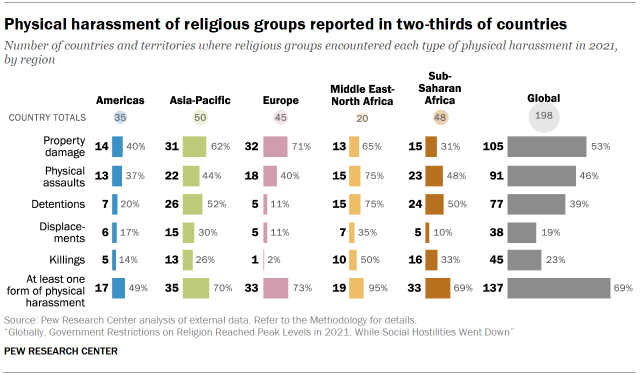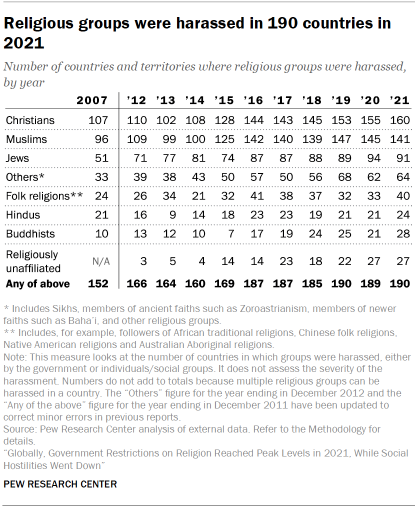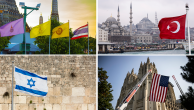In 2021, religious groups faced harassment from governments or social groups and individuals in 190 out of the 198 countries and territories in our study. This was an increase from 2020 but the same number of countries as in 2019, marking a return to the peak level since this tracking began in 2007.
Here’s a breakdown:
- Governments harassed people because of their religious beliefs and practices in 183 countries, up from 178 in 2020. This is the highest number since the start of the study.
- Social groups or private individuals harassed people for religious reasons in 164 countries, the same number as in 2020.
- Religious groups experienced harassment from governments and/or social groups and individuals in a total of 190 countries. This includes 157 countries with reported cases of religion-related harassment committed by both government officials and nongovernmental actors.
These figures include all countries in which at least one incident of any type of harassment targeting a religious group was reported during 2021 by this study’s sources. By harassment we mean a wide variety of actions from derogatory statements by government officials to physical acts of force. The data can provide a sense of how geographically widespread religious harassment is and whether certain types of harassment are rising or falling. But this study is not designed to determine which religious group faces the most persecution.
Examples of physical harassment include damage to property, assaults on people, detentions or arrests, displacements or deportations, and killings. Examples of verbal harassment include insults and derogatory public remarks, including statements to the press about religious groups.
People who do not identify with a religion, such as atheists or agnostics, are counted as targets of religious harassment if the sources used in the study indicate they were targeted due to their beliefs or non-beliefs. Humanists are included in a separate category from the religiously unaffiliated.
Physical harassment against religious groups
To examine incidents of religion-related harassment that are more severe, this section looks at five types of physical harassment that people faced because of their religious beliefs or practices: property damage, assaults on people, detentions, displacements, and killings.
In 2021, at least one of these types of physical harassment was reported against religious groups in 137 out of 198 countries and territories (69%), about the same as in 2020 (138 countries). Governments were responsible for this in 100 countries, the same number as in 2020. Private individuals or social groups physically harassed religious groups in 101 countries, a decline from 105 in 2020.
Property damage was the most common type of physical harassment reported against religious groups (in 105 countries, or 53%). Physical assaults were reported in 91 countries (46%), while detentions occurred in 77 countries (39%). Meanwhile, there were religion-related displacements in 38 countries (19%), and killings were reported in 45 countries (23%).

Property damage
Property damage against religious groups, occurring in 105 countries overall, was inflicted by governments in 65 of these countries and came at the hands of social groups or private individuals in 80. This category of harassment includes raids, evictions, closures, vandalism and unresolved restitution claims for land or buildings of religious communities seized in the past.
Europe had the highest share of countries where property damage related to religion was reported (71% of the 45 countries in the region).
In France, authorities reported in 2021 that they had shut down 21 mosques, accusing them of spreading radical ideology. (The government had put 92 mosques on a watchlist; it eventually removed 36 from the list after the mosques fulfilled the government’s requests to remove certain preachers and to refuse foreign funds.) And in Poland, there were multiple attacks against Catholic and Jewish sites by private individuals, including vandalism of statues at several Catholic churches and damage to dozens of tombstones in Jewish cemeteries.
Europe also had several countries that faced restitution cases for properties seized during the Holocaust or during a period of communist rule. In Romania, for example, the government responded slowly to such claims, according to the U.S. State Department. In 2021, Romanian authorities approved 23 requests for restitution of land or buildings that had been taken from religious groups but denied 471 other claims.
Across the Middle East and North Africa, 65% of the region’s 20 countries had reports of religion-related property damage in 2021, while the same types of incidents occurred in 62% of the 50 countries in the Asia-Pacific region.
Physical assaults
Physical assaults targeting people for religious reasons were reported in 91 countries in 2021. This includes 42 countries where governments were responsible for the assaults and 67 where social groups or individuals were behind them, according to the sources used in this study.
In the Middle East and North Africa, assaults were reported in 15 of 20 countries (75%), the highest share of any region. In Yemen, Houthi forces launched a missile attack on a Sunni-majority mosque on Oct. 31 and killed and injured “dozens” of people, according to the U.S. State Department.5 And in Israel, during the last Friday of Ramadan in May, police entered the holy site known to Muslims as the Haram al-Sharif (and to Jews as the Temple Mount) and used “teargas, stun grenades, and rubber tipped bullets to disperse Palestinians they said were throwing rocks,” according to the U.S. State Department. A similar incident occurred the following Monday. The Palestinian Red Crescent said more than 300 people were injured. Afterward, in an effort to reduce hostilities, police temporarily prevented non-Muslims from visiting the site.
Detentions
People were detained due to religious beliefs or practices in 77 countries. Governments detained people in many more countries (73) than did social groups (20). Detentions include kidnappings and arrests, such as actions by law enforcement agencies that are reported as being excessive, arbitrary or conducted without due process.
The Middle East-North Africa region had the highest share of countries in this category (15 out of 20, or 75%). In the Asia-Pacific region, more than half the countries (26 out of 50) reported religion-related detentions, while in sub-Saharan Africa, 24 out of 48 countries had such incidents cited in the sources for this study.
In Libya, 15 Christians were detained in an October 2021 crackdown on migrants that sources said caused other migrants to be fearful of attending church.
In Sri Lanka, 311 people remained in prison in 2021 – many of whom were being detained without formal charges – for “alleged connections” to the 2019 Easter Sunday bombings in the country that left more than 250 people dead and 500 wounded, according to the U.S. State Department. Authorities had arrested more than 2,000 people after the attacks, and in the following years also charged a prominent Muslim lawyer, two politicians and a poet. Attorneys and advocates for some of these well-known individuals said the government was unable to present sufficient evidence linking them to terrorism. (By the end of 2021, one was acquitted and two of the others were granted bail.)
Meanwhile, in Singapore, as of December 2021, Jehovah’s Witnesses stated on their official website that 17 of their members were being detained by the government for not complying with military conscription laws for religious reasons. And in Eritrea, the U.S. Commission on International Religious Freedom (USCIRF) estimated that at least 1,000 people, including religious leaders, were imprisoned for “religious activity or religious freedom advocacy.” The prisoners included the patriarch of the Eritrean Orthodox Church, who was ousted from his position in 2007 and kept under house arrest until he died in February 2022 (after the period covered in this report).
Displacements
Religion-related displacements and deportations occurred in 38 countries (19%) in 2021, with governments responsible in 29 countries. Social groups and individuals were blamed for forcing people out of their homes for religious reasons in 14 countries.
In Afghanistan, after seizing power in August 2021, the Taliban reportedly expelled at least 2,800 Shiite Hazaras from their homes and took over their properties in Daikundi and Uruzgan provinces. By the end of the year, more than 120,000 Afghans, including religious minorities, had been evacuated to the United States or other countries, while “masses” of people escaped to nearby countries out of fear of religious persecution, according to USCIRF.
In Indonesia, about 120 Ahmadi Muslims continued to be internally displaced after mob violence forced them from their village in East Lombok in 2006. And in Myanmar (also called Burma), more than 140,000 Rohingya Muslims were living in 21 displacement camps in the country while more than 800,000 previously displaced Rohingya lived across the border in neighboring Bangladesh as of 2021. In addition, 30,000 people from the Chin ethnoreligious group, which is mostly Christian, fled from Myanmar to India.
Killings
Killings based on religion were reported in 45 countries (23% of all countries in the study). Governments were behind such deaths in 22 countries, and social groups and individuals were responsible in 34 countries, according to the sources used in the study.
In China, members of Falun Gong, an illegal religious group, were reportedly mistreated in prison and died “in custody, or shortly after their release,” according to Freedom House. For example, a former colonel named Gong Piqi, who was arrested in 2017 for ties to Falun Gong, was said by authorities to have died in prison from a “sudden cerebral hemorrhage,” although his family and friends alleged he had marks of torture on his body. In Muslim-majority Bangladesh, mob violence during the Hindu festival of Durga Puja led to the deaths of at least four people, according to United Nations estimates. (Other sources said the number of deaths was higher.)
And in Ethiopia’s northern Tigray region, 78 priests were killed by the army and Eritrean soldiers in the first five months of 2021, as part of a conflict between the government and Tigray forces that began in November 2020. Also in 2021, in the Oromia region of Ethiopia, soldiers from the Oromo Liberation Army reportedly killed 29 people in a church where worshippers had gathered for the beginning of the Ethiopian Orthodox Tewahedo Church’s fasting period.
Which religious groups were harassed?
In 2021, Christians were harassed by governments or private actors in 160 countries, up from 155 in 2020. Meanwhile, Muslims faced harassment in 141 countries, down from 145 in 2020. Christians and Muslims are the largest religious groups in the world, and since the beginning of the study, they generally have faced harassment in a larger number of countries than any other group. (However, this figure is not a measure of the severity of harassment, and it should not be interpreted to mean that these religious groups are necessarily the world’s “most persecuted.”)
Jews were harassed by governments and social groups or individuals in 91 countries in 2021 (down from 94 countries in 2020), the third highest total of any religious group, although Jews make up just 0.2% of the world’s population.

Most religious groups analyzed in the study were harassed in more countries in 2021 than in 2020. This was the case for Buddhists, Christians, Hindus, practitioners of folk religions and adherents of other small groups (including Baha’is, Scientologists, Sikhs, Rastafarians, Zoroastrians and others).
Muslims and Jews faced harassment in fewer countries in 2021 than in 2020, according to the sources analyzed. People who are religiously unaffiliated, including atheists and agnostics, faced discrimination in the same number of countries as in 2020 (27).
Most religious groups faced harassment in more countries from governments than from social groups or individuals in 2021.
However, Jews and adherents of folk religions were harassed by governments and social groups or private individuals in almost the same number of countries. For example, Jews faced government harassment in 72 countries and social harassment in 73, while practitioners of folk religions faced government harassment in 25 countries and social harassment in 24 countries.




